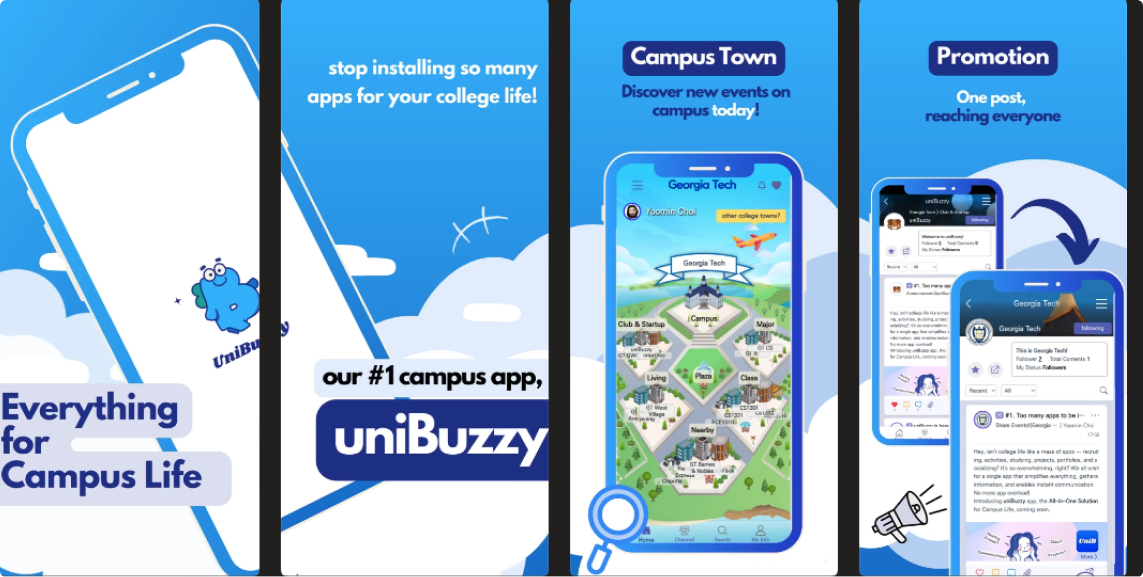Project Overview

UniBuzzy is a social networking app designed to connect college students within a vibrant campus community. The application allows students to participate in and stay updated on campus events, form friendships, and engage in various activities through an intuitive, easy-to-navigate interface. The goal is to enhance social interaction among students by providing a centralized platform for event invitations, private messaging, and interest-based community boards.
As the lead developer for the frontend, I played a crucial role in guiding the development team to bring UniBuzzy’s core functionality to life, ensuring seamless integration of event features, friend connections, and interactive boards. I worked closely with design and backend teams to align the UI with the overall project vision, creating a cohesive experience for the end-users that addresses their needs for social interaction on campus.
Role: Lead Front-End Developer
Time Frame: March 2024 - October 2024
Tech Stack/Skills: VueJS, Firebase, Express, Figma
Features
UniBuzzy is designed to enhance campus interactions through a variety of intuitive screens, including the Homepage, Post, Community Page, Events, and Friends. The Homepage provides a central hub for students to view and navigate trending campus events and popular community posts. The Post screen allows users to share updates, images, and insights directly with the campus community. The Community Page acts as a forum for open discussion, with topic-specific boards where students can onnect on shared interests. The Events screen is the heart of campus engagement, enabling students to explore, join, or create public and private events, with options to filter by event type and other categories. Lastly, the Friends screen allows users to add friends, send notes, and share schedules, building a personalized network within the app. These core screens work together to create an engaging, interactive experience tailored to college life.
Development
At the outset of the UniBuzzy project, I collaborated with the design team to help shape the core features and layout. Through iterative discussions, we refined elements like event invitations, community boards, and friend connection features to ensure they aligned with user needs. This process was essential in gathering feedback on how students would engage with each screen, setting a strong foundation for development.
Once the initial designs were in place, I led the frontend development, implementing components that would bring UniBuzzy’s vision to life. Working closely with stakeholders and team members, I developed engaging, responsive components for key screens such as the Homepage, Events, Community Page, and Friends. My role included integrating dynamic features for event filtering, friend requests, and real-time community posts to ensure a smooth and intuitive user experience across devices.
On the backend, I supported the development of a structured Firebase-powered authentication system for secure logins and Express API endpoints to handle data for user accounts, events, and friend interactions. This setup enabled reliable CRUD operations for managing posts, events, and profiles, with a focus on scaling as UniBuzzy expands.
Currently, we are focused on optimizing UniBuzzy's features based on user feedback, preparing for high-fidelity testing, and refining visual and functional elements to ensure an engaging and interactive experience as we approach full launch.
Future Improvements
The next phase of the UniBuzzy project involves continuing to develop and refine frontend screens and ensuring seamless user interactions. Key areas of focus include optimizing the Homepage, Events, and Community screens based on usability testing and real-world feedback from users.
As backend functionalities become available, the frontend team will work to integrate these features, allowing for smooth event creation, friend requests, and other key interactions. This will involve testing and refining the application to ensure consistency and reliability across devices.
Before transitioning off as the frontend lead, I provided comprehensive documentation to guide the next lead in continuing this work. This documentation includes detailed notes on the current frontend architecture, component interactions, and integration points with the backend, helping maintain consistency and support future improvements in UniBuzzy.
Learn more about the project here.